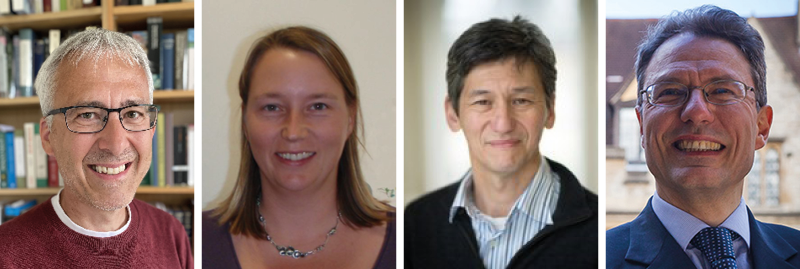Exeter Fellows helping to find solutions to the COVID-19 crisis

L-R: Ervin Fodor, Catherine Green, Christoph Tang and Luciano Floridi
Oxford University’s world-class researchers are at the forefront of understanding global changes and finding solutions to global problems. Among them are several Exeter Fellows who are contributing in different ways to the fight against COVID-19.
Ervin Fodor is Professor of Virology and Professorial Fellow in Experimental Pathology. He explains, ‘My research interests are centred on viruses, particularly influenza viruses, which are important human and animal pathogens causing widespread clinical and veterinary disease. My group focuses on the fundamental molecular mechanisms of influenza virus replication, aiming to understand the molecular determinants of host range and virulence of influenza viruses. By gaining further insights into the molecular aspects of influenza virus replication we hope to facilitate the development of novel strategies to combat influenza.’
His research is now focusing on ways to disrupt the spread of COVID-19: ‘Our lab is working with several academic and industrial collaborators to assess existing antivirals for their potential to inhibit the SARS-CoV-2 polymerase, essentially shutting down the virus’s ability to self-replicate. Our work will allow us to identify new candidates in this effort and aid the development of SARS-CoV-2 reagents. We’re currently gearing up to test a collection of polymerase inhibitor candidates on site.’
You can read more about Professor Fodor’s research here.
Catherine Green is Monsanto Senior Research Fellow at Exeter College. She is leading the efforts of the Clinical BioManufacturing Facility in Oxford to begin the production of potential COVID-19 vaccines. Dr Green and her team work to transform medical products, designed by scientists at the University, to provide practical solutions, manufacturing them to a high quality, to meet the standards of the regulating body (Medicines and Healthcare Products Regulatory Agency). Currently, they are collaborating with the Jenner Institute for Vaccine Research and the Oxford Vaccine Group to design and produce a SARS-CoV-2 vaccine.
You can read more about Dr Green’s research here.
Christoph Tang is Professorial Fellow in Cellular Pathology and Medicine. He has been collaborating with colleagues at the Oxford University Hospitals, particularly the head of molecular diagnostics at the John Radcliffe, Dr Monique Andersson, to help set up a diagnostic facility for COVID-19 at the Sir William Dunn School of Pathology.
Professor Tang explains: ‘We have adapted two labs at the Dunn School to take receipt of and process samples from the John Radcliffe, and the facilities have been accredited for handling clinical specimens. We have trained volunteers from across the South Parks Road Science area to work in the labs.’
You can read more about Professor Tang’s work here.
Luciano Floridi is Professor of Philosophy and Ethics of Information at the Oxford Internet Institute, Director of the Digital Ethics Lab, and a Fellow by Special Election at Exeter College. Professor Floridi is a member of the NHS Covid-19 App Data Ethics Advisory Board. On being appointed to the Board he wrote on Twitter, ‘I am honoured to join the Ethics Advisory Board for NHSx COVID-19 app and grateful for the opportunity to be of some help.’ You can read more about Professor Floridi’s work here.
Among the former Exeter Fellows also helping in the battle against COVID-19 is Dr Gail Hayward, who was Staines Medical Research Fellow at Exeter until September 2018. Dr Hayward is a GP and an Associate Professor in Primary Care with a background in diagnostics and infections. She is also examining how primary care out-of-hours services can be improved and sits as the Deputy Director of the NIHR Community Healthcare Medtech and IVD Cooperative.
Dr Hayward is a co-Principle Investigator on the PRINCIPLE trial which is a response adaptive platform trial aiming to evaluate treatments for patients with COVID-19 in the community. She says, ‘We are aiming to find out which medicine could reduce a patient’s chance of hospitalisation and death.
‘There is a huge energy and goodwill to achieve this very ambitious trial here in Oxford, and we are lucky to have such a wide range of expertise to draw upon.’
Dr Hayward is also co-lead on a recently announced project that will assess the efficacy of tests designed either to detect current COVID-19 infection or to find out if someone has previously been infected with the virus. The COVID-19 National DiagnOstic Research and Evaluation Platform (CONDOR) will create a single national route for evaluating new diagnostic tests in hospitals and in community healthcare settings. The £1.3 million research programme will bring together experts who are highly experienced in evaluating diagnostic tests and generating the robust evidence required for a test to be used in the NHS.
Dr Hayward explains: ‘Right now, there’s a critical gap in how we road-test new diagnostics for COVID-19. By robustly evaluating these diagnostics in health and care settings, the CONDOR programme will help the government and clinicians to understand the real-world accuracy of these tests in patients presenting with COVID-19 symptoms in the NHS.’
The research will assess multiple diagnostic tests at once at sites across the country and can be adapted to add in new tests as they become available. The CONDOR programme is one of a number of COVID-19 studies that have been given urgent public health research status by the Department of Health and Social Care, to expedite its delivery in the health and care system.
